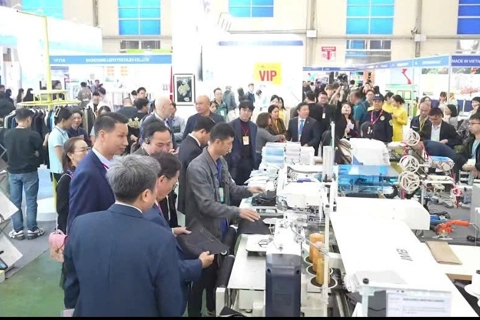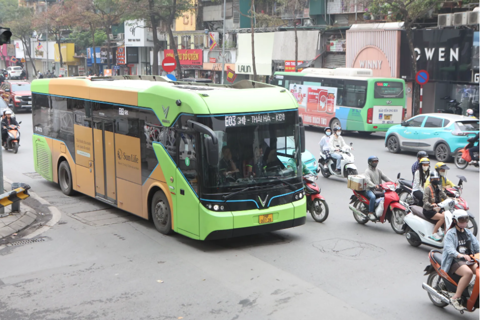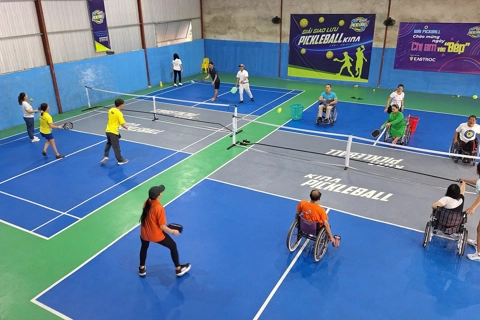Hanoi
Hanoi determines to protect pavement for pedestrians
Dec 23, 2017 / 07:21 AM
Hanoi authorities are installing fences along sidewalks in a pilot program to prevent vehicles from encroaching them.
The sight of motorbikes and cars climbing onto sidewalks to seek an alternative route during traffic jams has been common in Hanoi for years. It not only endangers pedestrians but also destroys sidewalks which are not designed for vehicles.
Fences have been erected along sidewalks on some streets in downtown Hanoi like Ton Duc Thang, Nguyen Thai Hoc, Ngoc Hoi, Le Duan, and Dai Co Viet over the past year. The measure aims to protect pedestrians and ensure traffic order.

Nghiem Ngoc Tram, a resident living near Nguyen Thai Hoc street told Thanh Nien (Young People) newspaper that since the fences were installed, cars and motorbikes were unable to climb over the sidewalks around Van Mieu Quoc Tu Giam (The Temple of Literature). “My family totally supports the plan. Thanks to the fences, we feel more secure when kids and old people use the sidewalks as we don’t need to worry that motorbikes and cars will hit them,” she said.
Nguyen Hoang Hai, an expert on urban traffic said the installation of barriers to separate sidewalks from roads is a feasible measure to solve the problem. “In some streets where the measure was adopted like Le Duan or Van Mieu, the result has been positive. The walking space was protected, creating the feeling of safety and comfort for pedestrians,” he said.
In a Hanoi People’s Council Q&A session on December 6, deputy Nguyen Huy Duoc proposed the same measure to restore sidewalk order. However, some people warned that if the plan is expanded, some issues need to be taken into account.

Le Dung, a resident of Ton Duc Thang street told Economic & Urban Newspaper that the fences have caused obstacles for some people. “In some places, the space between fences is not enough for a wheelchair user to get through. Some shops along the street also face difficulties as the barriers stop their customers accessing the shop and parking their vehicles,” he said.
Dinh Quoc Thai, an expert on urban traffic said fences should not be installed on busy trading streets as it would harm people’s businesses which are their means of living. “People would oppose the plan and even remove the fences themselves while authorities could hardly control it,” he said.
He suggested fences be installed on sidewalks mostly serving pedestrians or those near cultural spaces. The installation should also be carefully considered so that the barricades do not obstruct wheelchairs and baby strollers, he said.
An alternative measure to replace fences is to increase the height of the sidewalk’s edge so vehicles cannot climb them, he added. Nguyen Hoang Hai agreed that this is not a one-size-fits-all solution. There should be city-wide surveys to decide which streets are suitable and which are not. On streets where fences are not the solution, authorities can install cameras to record violations and later apply strict punishments, he said.
Fences have been erected along sidewalks on some streets in downtown Hanoi like Ton Duc Thang, Nguyen Thai Hoc, Ngoc Hoi, Le Duan, and Dai Co Viet over the past year. The measure aims to protect pedestrians and ensure traffic order.

Nguyen Hoang Hai, an expert on urban traffic said the installation of barriers to separate sidewalks from roads is a feasible measure to solve the problem. “In some streets where the measure was adopted like Le Duan or Van Mieu, the result has been positive. The walking space was protected, creating the feeling of safety and comfort for pedestrians,” he said.
In a Hanoi People’s Council Q&A session on December 6, deputy Nguyen Huy Duoc proposed the same measure to restore sidewalk order. However, some people warned that if the plan is expanded, some issues need to be taken into account.

Le Dung, a resident of Ton Duc Thang street told Economic & Urban Newspaper that the fences have caused obstacles for some people. “In some places, the space between fences is not enough for a wheelchair user to get through. Some shops along the street also face difficulties as the barriers stop their customers accessing the shop and parking their vehicles,” he said.
Dinh Quoc Thai, an expert on urban traffic said fences should not be installed on busy trading streets as it would harm people’s businesses which are their means of living. “People would oppose the plan and even remove the fences themselves while authorities could hardly control it,” he said.
He suggested fences be installed on sidewalks mostly serving pedestrians or those near cultural spaces. The installation should also be carefully considered so that the barricades do not obstruct wheelchairs and baby strollers, he said.
An alternative measure to replace fences is to increase the height of the sidewalk’s edge so vehicles cannot climb them, he added. Nguyen Hoang Hai agreed that this is not a one-size-fits-all solution. There should be city-wide surveys to decide which streets are suitable and which are not. On streets where fences are not the solution, authorities can install cameras to record violations and later apply strict punishments, he said.








